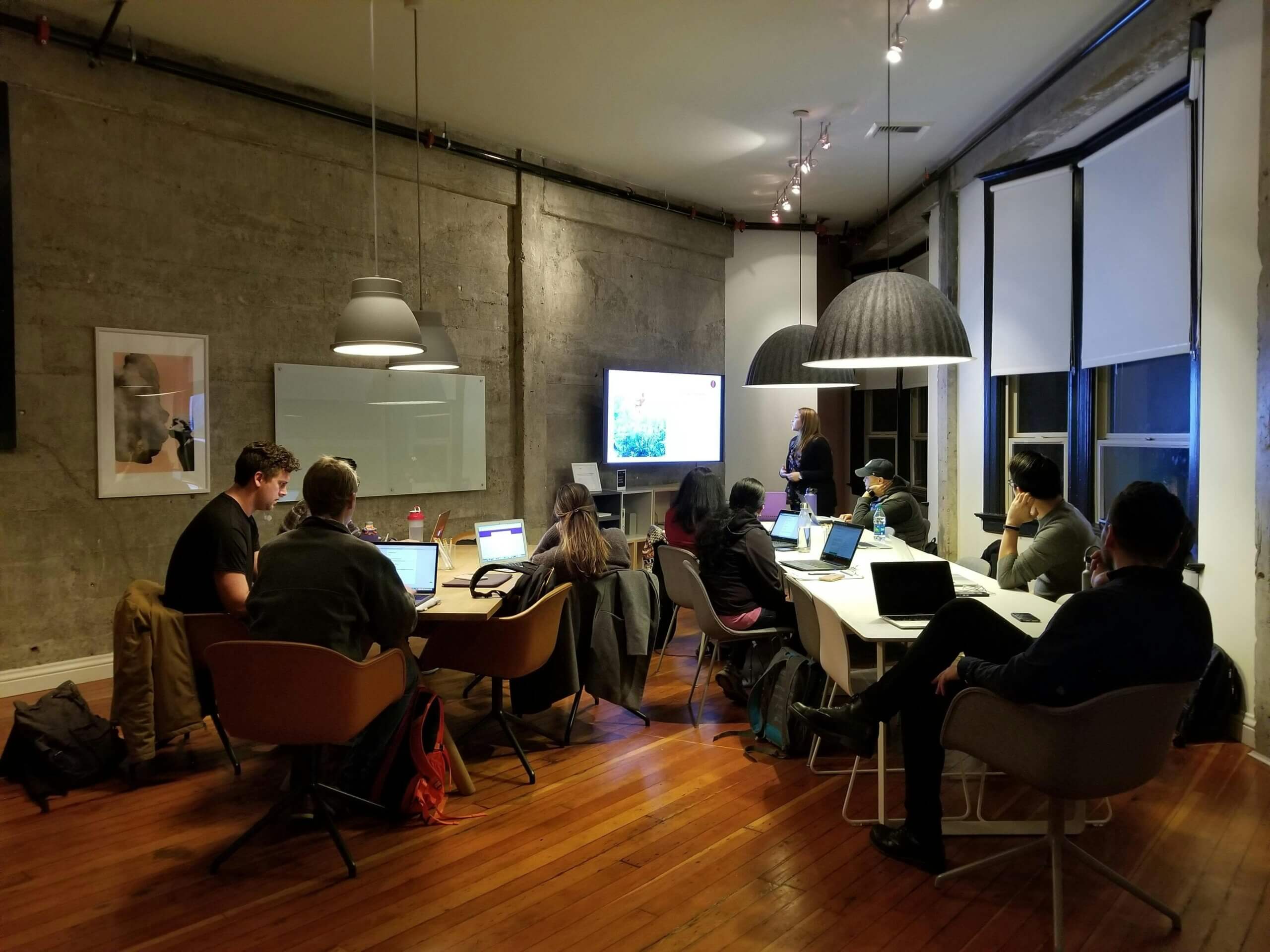A Beginner’s Guide to Today’s Most In-Demand Tech Skills
In our digital world, tech skills are no longer just for web developers, computer scientists or hackers. Instead, they’ve become essential tools for everyone. Whether you’re looking for a career change, you’ve recently graduated and searching for your first job or simply have a desire to increase your understanding of modern technology, learning the basics of the top digital skills is fun and rewarding.
Blog

Most in-demand tech skills: what are they and why do they matter?
From design to data, marketing to machine learning, this guide breaks down the most valuable tech skills in 2025. Plus, we’ll signpost you to places to get started if you want to improve your knowledge. Let’s take a closer look at the in-demand skills shaping today’s tech landscape…
Design, creativity & user experience
These roles blend tech and creativity, focusing on how users engage with digital products.
What is UX/UI design?
User Experience (UX) and User Interface (UI) design focus on how people interact with digital products. UX is about market research and experimentation to design smooth, intuitive experiences, making things as user-friendly as possible for people using an app or website. Whereas UI is all about making the designs a reality, bringing it to life; think layouts, buttons, and colours. Together, they ensure websites and apps are easy and enjoyable to use. For example, designing a mobile banking app so users can transfer money in just a few taps is a result of effective UX/UI design.
As businesses increasingly prioritise user-centred design, UX/UI skills are in high demand across industries.
Want to learn how to design with purpose? Explore our ‘Creating a Great User Experience for Mobile Apps’ course for FREE!
Careers in digital marketing & content creation
Digital marketing is at the centre of most modern brand strategies. It covers everything from social media, paid advertisements, search engine optimisation (SEO), email campaigns and data analytics. Pair that with content creation, and you’ve got the skills to reach and engage online audiences effectively; think photography, copywriting, graphic design, writing blogs, editing videos and more!
For example, a small business may create a series of how-to videos to promote its products on TikTok. The content manager might handle filming and editing, while the marketing coordinator monitors trends, writes captions and optimises posting times. In another scenario, a large fashion brand might launch a new product with an integrated campaign across social media, email, and its website. The content team might work with photographers and external design agencies to create eye-catching visuals and product descriptions. At the same time, the marketing team may be setting up targeted ads, securing media and influencer coverage, and A/B testing subject lines for its email marketing campaigns.
This kind of collaboration ensures consistency across channels and maximises impact. These roles often sit within the same department, but the responsibilities can vary widely. In some organisations, especially smaller ones, you might be expected to do a bit of both, so being versatile is important.
Want to create digital content that makes an impact? Start learning digital marketing with our ‘Click Start Get Into Digital – Accelerate’ programme.

Data & AI
These skills help you collect, interpret and predict information to drive innovation.
What is the difference between data analysis & data science?
Data is everywhere, and the ability to work with it is one of the most valuable skills in today’s job market. But when people talk about “data skills,” they’re often referring to two overlapping, yet distinct, areas: data analysis and data science.
What is data analysis?
Data analysis is about understanding what’s already happened. It involves cleaning and sorting raw data, spotting trends, and turning complex information into something meaningful. A big part of this role includes data visualisation: creating charts, graphs or dashboards to clearly communicate insights. Data analysts might focus on reporting, dashboards, or tools like Excel, Power BI or Tableau.
What is data science?
Data science builds on those foundations but goes deeper into the technical side. It’s more about exploring why things happen and what might happen next. Data scientists use programming, statistics, and sometimes machine learning to solve bigger, more complex problems. A data scientist will typically work with larger datasets, more advanced models, and tools like Python, R or TensorFlow.
An industry where data is crucial is sport. In football, a data analyst might track how many goals were scored in the last five games and highlight performance trends. A data scientist could combine player biometrics, training data, and match footage to predict injury risks or simulate match outcomes depending on different formations or weather conditions.
Whether you’re more comfortable with Excel or Python, there’s space for a wide range of skill sets in the world of data. Want to learn to utilise the power of data? Check out our ‘Click Start Peckham Digital Accelerator Zone’ programme, which features an ‘Introduction to Data Science’ module.
How to learn generative artificial intelligence skills?
Generative Artificial Intelligence (Gen AI) is transforming how we work, live, and interact online. From chatbots, to search engines, to health assistants, AI mimics human intelligence using large language models (LLMs), algorithms and data. For example, Netflix has used TrueSync AI to assist with dubbing shows and movies into different languages, matching the mouth movements of the actors with the dubbed language.
Learning how it works, how to use it, how to maximise it, and its ethical implications is something everyone should do. Even if it just helps you recognise AI images and deep fakes, then that’s a win.
Curious about AI and machine learning? Begin your AI journey with ‘Click Start by The Open University’.

Software development & engineering
These are the behind-the-scenes skills that bring digital products and services to life.
Are full stack developers important?
Full stack developers are the real all-rounders of the tech world. They can work on both the front-end (what users see) and the back-end (servers, databases) of websites and applications with ease. For example, a full stack developer might plan, design, build and deploy an entire e-commerce site whilst incorporating the needs of other departments into the site.
Having a solid grasp of both sides makes these developers highly valuable in the job market. Full stack skills are especially useful in start-ups and small teams, and being versatile and flexible is an essential part of this role.
Interested in building websites and apps from start to finish? ‘Learn to Code for the Web’ and get the skills you need to go full stack!
What is DevOps?
DevOps is a blend of “development” and “operations”, focusing on streamlining and automating the processes between software development and IT teams. It involves practices like continuous integration, deployment, and monitoring, making the development cycle of new products and services faster and more reliable. For example, automatically testing and deploying new code changes is a common DevOps practice, saving time and human input.
With the rise of agile and cloud-based workflows, DevOps skills are highly sought-after.
Keen to understand how modern software teams work behind the scenes? Check out our ‘Working with Integrated Development Environments (IDEs)’ programme.

Cyber security & infrastructure
Tech skills that focus on securing and supporting digital systems and data.
Get jobs in cyber security
Cyber Security is all about protecting digital systems, networks, and personal data from attacks or unauthorised access. With the ever-increasing threat of cyber-attacks and data breaches, companies across all sectors are investing in cyber security experts.
Even if you don’t want to work in Cyber Security, learning the fundamentals of cyber security can also help you better protect yourself online. For instance, setting up two-factor authentication is a simple and learning to recognise phishing attempts are two simple but effective cyber security measures you could take.
Want to learn more? Study the basics of Cyber Security with our ‘Cyber Foundations’ module.
Is cloud computing a growing industry?
Cloud computing powers many of the tools we use daily, from Google Drive to Amazon to your smart watch. Instead of storing data and programmes on a local computer, cloud services allow you to access them over the internet. This technology is vital for businesses, especially small businesses, looking for cost-effective and flexible ways to host their services. For instance, a company might use Amazon Web Services (AWS) to host its website and securely store user data. This ensures services stay online when their website receives higher traffic than normal and is cheaper than building and running their own servers.
Roles in cloud architecture and administration are growing fast, as are the salaries.
Want to understand the cloud and how it powers the tech world? Try our ‘How to Get Into Cloud Computing’ course for free today!
What is blockchain?
Blockchain is best known as the technology behind cryptocurrencies, but its applications go much further than that. From digital identity verification to supply chain management, blockchain is revolutionising the future of the internet. At its core, blockchain is a decentralised way to record transactions. It’s extra secure due to the ‘blocks’, which once formed into the ‘chain’, are almost impossible to tamper with.
For example, blockchain can be used to trace the journey of food from farm to supermarket, ensuring transparency, traceability and safety. While still an emerging field, understanding blockchain could position you at the forefront of innovation and you could very quickly find yourself in a high-paying role.
Think a career in blockchain could be for you? Learn ‘How to Get Into Blockchain’ with Click Start.

Business, strategy & digital economy
These skills help you build, manage, and grow online ventures in a connected world.
Start an eCommerce store & digital business
With most businesses now operating in the online space, tech skills in digital business are becoming increasingly important. Managing digital storefronts, understanding eCommerce platforms like Shopify, and customer journey optimisation are incredibly useful. For example, creating a Shopify store and running Google Ads to promote it is a practical application that employers would love to see on your CV.
Whether you’re working for a brand or launching your own side hustle, these skills can help you prosper in our digital economy.
Want to launch or support an online business? Get the skills you need to ‘Create a Professional Online Presence’!

Technology is not going away, so now’s the perfect time to get involved. Whether you’re exploring data analysis, experimenting with design, or joining the AI race, building a foundation in tech can lead to exciting personal and professional growth. We’re here to help you take that first step with free online courses led by top universities and employers.
Start learning today and build the tech skills for tomorrow: browse all our courses.




